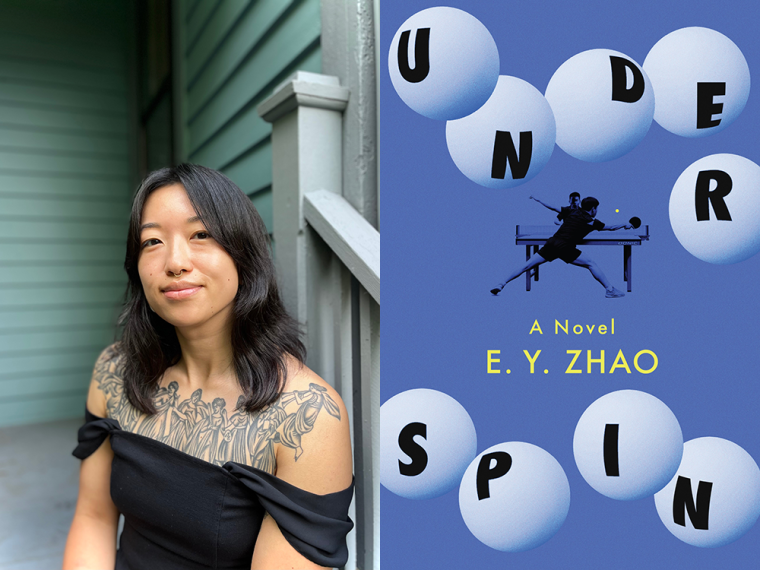This week’s installment of Ten Questions features E. Y Zhao, whose debut novel, Underspin, is out today from Astra House. The novel opens on a funeral running thirteen minutes late: The parents of Ryan Lo, a table tennis champion dead at twenty-four years old, won’t start the service until their son’s coach arrives. Until now, the coach has always been on time. Zhao then rewinds through the trajectory of Ryan’s brief life, in a narrative that volleys between characters: from Kevin, who trained alongside Ryan, the ruthless golden boy of the junior leagues, to Kagin, a regional umpire made uneasy by the tense interactions between a teenage virtuoso and the man training him. When Ryan, now twenty-one, joins the German Bundesliga, the league’s psychologist recognizes in Ryan that same “affliction of ego” that cost him his own career. But what Ryan’s coach remembers is the moment of proudly putting an arm around his victorious new protégé and feeling “the squared shoulders of a boy proud and unoppressed.” Who is right, and what went wrong? Kirkus Reviews described Zhao as “a master of careful plotting and mystery—the real kind that cottons to morally complex situations.” Laura van den Berg agreed, calling Underspin “as suspenseful as a championship game and as perfectly orchestrated as a winning shot.” E. Y. Zhao is a writer from Saint Louis. Her work has appeared in the Georgia Review, Electric Literature, and the Chicago Review of Books. She edits fiction for Joyland Magazine.

E. Y. Zhao, author of Underspin. (Credit: Sean Julia Civale)
1. How long did it take you to write Underspin?
Drafted it over a year, then revised for another few months with my agent before submitting to publishers.
2. What was the most challenging thing about writing the book?
Overcoming doubt about my writing ability and vision for the book. People kept asking why it wasn’t from the central character’s point of view, which is fair! When I started the book, I knew why, but it got to a point with feedback where I didn’t see it as a subjective choice I had authority over; I figured I must be delusional, tasteless, undisciplined, etc.
3. Where, when, and how often do you write?
I’ll write anytime in any format, usually after work and weekend mornings. Sometimes longhand, sometimes in Word. I try to write every day, whether that’s generating new words or taking a walk to think about a revision problem.
4. What are you reading right now?
I’m halfway through My Struggle Volume 6 and In Search of Time Volume 7. This is so corny, but I’m nervous that when I finish the Proust I’ll perish?
Less melodramatically, I’m progressing through The Flanders Road by Claude Simon and a couple Jean Giono novels, Hill and Open Road. These novels are, ironically, for a project about a guy stuck inside his house, in a flat part of the Midwest.
5. Which author, in your opinion, deserves wider recognition?
About a dozen names spring to mind, but I’ll go to bat for Attila Bartis, a Hungarian writer whose novel The End (translated into English by Archipelago) soaked into my blood like mercury.
6. What is the biggest impediment to your writing life?
Social media. Before Underspin I hadn’t had Instagram for five years. Then I made one to market the book; the damage to my attention is insane. I look forward to deleting it soon.
7. What is one thing that surprised you during the writing of Underspin?
How capacious a novel can be. I read a lot during the years I was writing. At the beginning I had a pretty narrow, identifiable aesthetic range within Anglo-American fiction; by the end I was thinking and revising in ways unachievable a couple years before. Many books and events had worked their way in, even though I started with a clear vision (“Goon Squad for table tennis”). Some readers will probably find it hodge-podgey, but I always go back to James Salter’s simple advice: “Don’t save anything.”
8. If you could go back in time and talk to the earlier you, before you started Underspin, what would you say?
I’m a fairly stubborn person, so I don’t know if anything I said could get through. Take fewer tequila shots at The Last Word, maybe. Strengthen your hip flexors earlier.
9. Outside of writing, what other forms of work were essential to the creation of Underspin?
Playing table tennis, lifting weights, and going on long walks without my phone.
10. What’s the best piece of writing advice you’ve ever heard?
When Rebecca Makkai visited Michigan, she said the hardest thing in writing a novel—whether that’s a scene, topic, structure, etc.—is probably its true subject, and you need to incorporate it deliberately into the book. That unlocked Underspin for me and has kept me sane through many drafting processes since.







